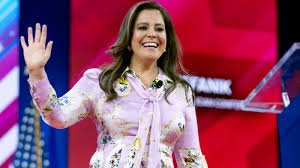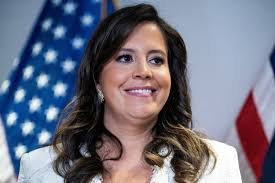Trump Picks Elise Stefanik as U.N. Ambassador
Former President Donald Trump has recently nominated Republican Congresswoman Elise Stefanik as the U.S. Ambassador to the United Nations (U.N.). This decision marks a significant move in Trump’s foreign policy strategy, with Stefanik poised to replace the current U.N. Ambassador in what could become a pivotal role in shaping U.S. diplomatic relations globally. Known for her strong stance on foreign policy, Stefanik’s appointment has drawn mixed reactions, with supporters praising her leadership qualities and critics questioning her experience in global diplomacy.
Elise Stefanik’s Background and Qualifications
Elise Stefanik, a representative from New York, has served in the U.S. House of Representatives since 2015. Over her tenure, she has become a prominent figure in the Republican Party, known for her staunch support of conservative policies, especially in areas such as national security and foreign affairs. Stefanik has built a reputation for her communication skills and her ability to unite various factions within her party. However, critics have raised concerns about her relatively limited experience in international diplomacy, which may pose challenges in her new role at the United Nations.
The Role of U.N. Ambassador
The U.N. Ambassador serves as the U.S. government’s chief representative to the United Nations, playing a crucial role in shaping U.S. foreign policy on the international stage. The Ambassador is responsible for advocating U.S. interests in the U.N. Security Council, General Assembly, and other multilateral forums. They also work closely with international leaders and other U.N. agencies to address global challenges such as climate change, security threats, and human rights issues.

Why This News Is Important
Impact on U.S. Foreign Policy
The nomination of Elise Stefanik as the U.N. Ambassador underlines former President Trump’s approach to reshaping U.S. foreign policy. By choosing a figure with a solid base in the U.S. political system, Trump is likely aiming for a more domestically-focused international strategy. Stefanik’s role in the U.N. would be pivotal in defining how the U.S. approaches global conflicts, negotiations, and treaties, particularly in a post-pandemic world that requires robust diplomatic engagement.
Implications for U.S.-U.N. Relations
The U.N. plays a crucial role in global diplomacy, and having a strong, assertive leader like Stefanik could change the dynamics of U.S. relations with international institutions. While Stefanik’s nomination may bolster U.S. influence within the U.N., it could also lead to tensions with countries that oppose the U.S.’s more assertive stance, especially on issues like climate change, arms control, and human rights.
Political Ramifications
The nomination also has significant political ramifications within the U.S. political landscape. It may strengthen Trump’s position within the Republican Party as he continues to assert influence post-presidency. It may also attract support from conservative groups who view Stefanik as a representative of their values. On the other hand, critics from both sides of the aisle may question her ability to represent the U.S. effectively on the global stage, especially given her limited foreign policy experience.
Historical Context
U.S. Ambassadors to the U.N.
The role of the U.N. Ambassador has been central to shaping U.S. foreign policy since the establishment of the United Nations in 1945. Over the years, the U.S. Ambassador has been involved in some of the most crucial diplomatic efforts, including leading U.S. positions on issues such as the Vietnam War, the Gulf War, and the Israel-Palestine conflict. Past U.N. Ambassadors, such as Madeleine Albright, John Bolton, and Nikki Haley, have all played critical roles in representing U.S. interests on the international stage, often navigating complex geopolitical situations.
Trump’s Approach to Diplomacy
Under Donald Trump’s administration, the U.S. adopted an “America First” approach, withdrawing from several international agreements, including the Paris Climate Accord and the Iran Nuclear Deal. Trump’s decision to appoint Stefanik, a staunch ally, reflects his desire to continue this approach by appointing someone who is aligned with his worldview on U.S. sovereignty, military power, and international diplomacy.
Key Takeaways from “Trump Picks Elise Stefanik as U.N. Ambassador”
| S.No | Key Takeaway |
|---|---|
| 1 | Elise Stefanik nominated as U.S. Ambassador to the U.N.: Former President Trump has selected Elise Stefanik for this crucial diplomatic role. |
| 2 | Stefanik’s political background: Elise Stefanik has represented New York in the U.S. House of Representatives and is known for her strong Republican stance. |
| 3 | Role of U.N. Ambassador: The U.N. Ambassador represents U.S. interests in the U.N. and plays a key role in shaping global diplomacy. |
| 4 | Impact on U.S.-U.N. Relations: Stefanik’s appointment could shift U.S. strategies in international relations, focusing on a more assertive, domestic-first approach. |
| 5 | Political ramifications: Stefanik’s nomination could strengthen Trump’s influence in the Republican Party and U.S. politics, but it may raise concerns about her diplomatic experience. |
Important FAQs for Students from this News
Who is Elise Stefanik and why was she nominated as U.N. Ambassador?
- Elise Stefanik is a Republican Congresswoman from New York, nominated by former President Donald Trump as the U.S. Ambassador to the United Nations. She was chosen for her leadership within the Republican Party and her strong stance on national security and foreign policy.
What does the U.S. Ambassador to the United Nations do?
- The U.S. Ambassador to the U.N. represents U.S. interests at the United Nations, participates in diplomatic discussions, and advocates for U.S. policies in the U.N. Security Council and General Assembly. They also work on addressing global challenges like security, climate change, and human rights.
How will Stefanik’s nomination affect U.S.-U.N. relations?
- Stefanik’s nomination could impact U.S.-U.N. relations by further emphasizing a more assertive U.S. stance in global diplomacy, which may strengthen U.S. influence but also lead to tensions with countries critical of U.S. policies.
What political implications does Stefanik’s nomination have?
- The nomination could solidify Trump’s influence within the Republican Party and potentially strengthen conservative policies in U.S. foreign relations. However, it may also face opposition from critics who question her experience in international diplomacy.
What is the significance of the role of U.N. Ambassador?
- The role of the U.N. Ambassador is pivotal in shaping U.S. foreign policy on the global stage. It involves leading the country’s representation in the U.N., particularly during negotiations on global security issues and international treaties.
Some Important Current Affairs Links

















